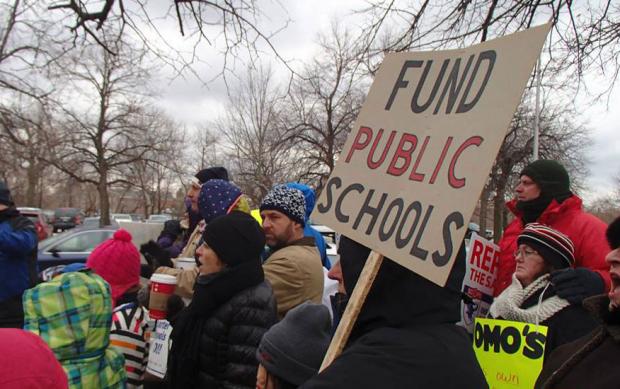BTF Claims Free Speech Violated in School Board Meetings
Yesterday, the Buffalo Teachers Federation (BTF) preserved its right to sue the Buffalo School Board by filing a notice of claim. Under the law, in order to maintain a claim against a municipality or municipal entity, a notice of claim must be filed within 90 days of the harm.
As The Public reported last week, Kevin Gibson, a Buffalo school teacher and BTF secretary, attempted to speak at a board meeting. Instead, he was escorted out by the police. The notice of claim alleges that his constitutional right to free speech was therby violated. Teachers are not the only ones being treated dismissively during this process; the BOE appears to be making a habit of discouraging the raging public debate over education.
While regular board meetings are open to public comment, the school district maintains that this was a work session and not a public hearing—open to the public but not open to public comment.
Mel Holden, a teacher who was present at the meeting, disagrees. “Other people were allowed to speak. Why wasn’t Kevin? I don’t get it. Very confusing and ridiculous and arbitrary,” she said. “I noticed Kevin standing alongside the wall behind the podium. He waited patiently. I was standing behind the camera. (You can hear me say, ‘Serious?’) Larry Quinn was very dismissive. I heard him say a number of times, ‘This is not a BTF meeting.’ He even said it before Kevin spoke. I was thinking he knew who Kevin was.
“If there are rules and procedures, they are not made clear to the public ,and it seems as though nothing in terms of rules and procedures was being followed last Wednesday,” Holden said.
The First Amendment generally prohibits governmental discrimination based on the content or viewpoint of an individual’s speech. For example, a law prohibiting citizens from criticizing elected officials would be impermissible because it would discriminate on the basis of content, allowing praise of government officials but not allowing criticism. Here, Kevin Gibson’s content will be a question of fact since he did not actually get to say what he was going to say. So it may be difficult for the BTF to establish that his constitutional rights were violated based on his viewpoint. However, if the BOE knew who he was, and if it can be established that they prohibited him from speaking because they knew what he was going to say, and disagreed with his position, BTF’s claim may survive.

